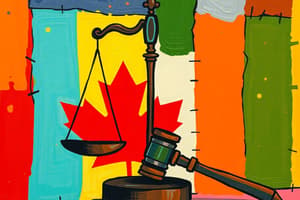Podcast
Questions and Answers
Match the legal concepts with their descriptions:
Match the legal concepts with their descriptions:
Royal Assent = A law is formally approved by the Governor General. Restitution = Involves compensating victims for crimes committed against them. Common/Case Law = Developed through judicial decisions and court rulings over time. Tort Law = Addresses civil disputes resulting from negligence or wrongful acts causing property damage.
Match the foundational legal documents with their significance:
Match the foundational legal documents with their significance:
Code of Hammurabi = An ancient Babylonian legal document dating back to 1755-1750 BC. Magna Carta = A foundational document limiting the powers of the monarchy, agreed upon in 1215. Greek Law = Ancient rules that governed early Greek citizens. Amendment = Refers to changes made to existing laws.
Match the types of law with their primary focuses:
Match the types of law with their primary focuses:
Family Law = Governs legal relations among family members, encompassing marriage, child custody, and divorce. Justice = Ensures fairness and equity in legal proceedings. Rehabilitation = Focuses on reforming offenders through education and training to reintegrate into society. Procedural Law = Governs the processes undertaken by law enforcement and courts.
Match the legal principles with their functions:
Match the legal principles with their functions:
Match the laws with their societal roles:
Match the laws with their societal roles:
Match the historical documents with their contributions to law:
Match the historical documents with their contributions to law:
Match the key legal terms with their definitions:
Match the key legal terms with their definitions:
Match the concepts of justice with their implications:
Match the concepts of justice with their implications:
Flashcards are hidden until you start studying
Study Notes
Royal Assent
- Formal approval of a law by the Governor General, symbolizing Canada's link to the British monarchy.
Constitutional Law
- Regulates the distribution of powers among various government levels.
- Safeguards citizens' rights and prevents governmental tyranny.
Retribution
- Punishment based on the principle of payback and vengeance.
- Reflects a societal demand for justice by penalizing wrongdoers.
Greek Law
- Ancient legal system governing early Greek citizens.
- Established foundational democratic practices, including jury systems.
Common/Case Law
- Developed gradually through judicial decisions and court rulings.
- Balances consistency in legal interpretations with adaptability to changing laws.
Family Law
- Governs legal relationships among family members, covering marriage, custody, and divorce.
- Offers structured methods to resolve domestic disputes.
Restitution
- Involves compensating crime victims for wrongs committed against them.
- Supports democratic ideals and aids lower classes by repaying victims rather than solely punishing offenders.
Justice
- Focuses on ensuring fairness and equity within legal proceedings.
- Upholds the principle of fair treatment throughout the justice system.
Rule of Law
- Asserts that no individual is above or below the law.
- Guarantees equal treatment under the law, irrespective of social or economic position.
Tort Law
- Addresses civil disputes arising from negligence or wrongful acts causing property damage.
- Protects individuals against harm to their property, whether intentional or accidental.
Rehabilitation
- Concentrates on reforming offenders through education and training for societal reintegration.
- Aims to reduce recidivism by tackling underlying criminal behaviors through various programs.
Jurisdiction
- Defines the scope of authority within which legal power is exercised.
- Establishes the appropriate court system for adjudicating specific legal cases.
Procedural Law
- Governs the processes carried out by law enforcement and courts.
- Ensures equitable treatment and safeguards rights within the criminal justice framework.
Code of Hammurabi
- An ancient Babylonian legal document dating back to 1755-1750 BC.
- One of the earliest examples of codified laws, promoting legal consistency.
Magna Carta
- A seminal document from 1215 limiting the powers of the monarchy.
- Represents the first instance in written law that asserts the king and government are subject to the law.
Amendment
- Refers to modifications made to existing laws.
- Allows laws to evolve with changing societal values and norms.
Studying That Suits You
Use AI to generate personalized quizzes and flashcards to suit your learning preferences.



